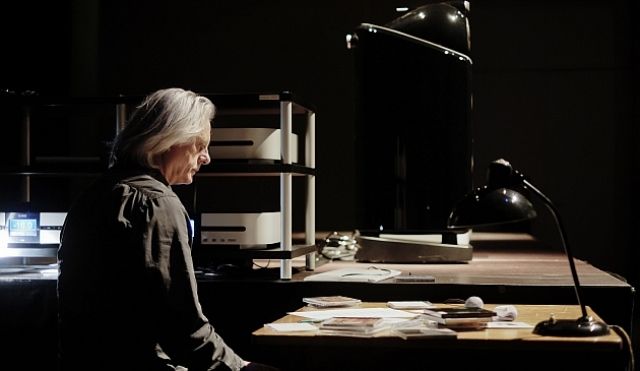
The Keith Jarrett trio play the Gasteig in Munich the same night as ECM founder Manfred Eicher turns 70
Photo: Haus der Kunst, Munich/Jörg Koopmann
On Tuesday night in a 1980s-era red brick concert hall in Munich, one particular person will be sitting in the audience at the Gasteig Philharmonie. On stage no ordinary birthday party band, not that ECM founder and owner Manfred Eicher who celebrates his 70th birthday that night would recognise such a notion. As the lights dim and the Keith Jarrett standards trio take to the stage what must he be thinking as he listens to a trio that has been immersing itself in jazz history and in the process making some more itself for 30 years?
Eicher shares the history-making process in common with the musicians on stage. Born in the German city of Lindau in Bavaria, growing up by the eastern shores of Lake Constance, Eicher, an “amiable ascetic with a tidy moustache, and medium-length grey hair”, as The Guardian recently described him, founded ECM in 1969 and the label’s first album released is now almost impossibly collectable and rare. The work of the former Billie Holiday pianist Mal Waldron it was called Free at Last, three words that resound in the label’s personal dictionary. Eicher’s career is one of echoing footfalls, aural shadows that grow bigger as the years pass by. He is someone whose label is also a style, a sound, as easily detected as Motown, as Blue Note, or Atlantic. In the lineage of the other great label chiefs (Alfred Lion of Blue Note springs to mind immediately) Eicher changed the face of jazz and particularly the perception of jazz created in Europe whether by touring Americans or the Europeans themselves. The unity of the music whether jazz or classical coalesces with the look, the graphics, almost within the five seconds of silence at the beginning of each record, the intensely serious nature of the venture leavened only by the joy and release of the music created by the artists themselves. Eicher could have been a professional double bass player, joined the Berlin Philharmonic, and left making records to others. Instead he became the invisible listener, the ultimate sonic observer, an artist of the mysterious element that makes a great record and valued as such by musicians who see him as one of them.
Just think of these great ECM landmarks early in the label’s existence. Record number seven, in the catalogue: Jan Garbarek’s Afric Pepperbird, the most significant statement by a European jazz artist since Django Reinhardt recorded with the quintet of the hot club of France. The dates: 22 and 23 September 1970. The place: Bendiksen Studio, Oslo. Or record number 17, just fourteen months later, still in that studio in Oslo, but this time what became Facing You, Jarrett’s first and arguably greatest solo piano album, The Köln Concert notwithstanding. Or what about across the Atlantic in New York in early-1972 and the making of Return to Forever, Chick Corea’s epoch-making statement for the label that marked the maturing of jazz-rock, hints of the New Age, and the astonishment provided by an utterly new synthesis? Just three glimpses from the early days of the label. What they have in common is not necessarily the music as all three pursue differing styles (although Jarrett’s and Garbarek’s merged later for a time in the Belonging band) it’s the intangible additional elements, the things Eicher’s label provides, knitting this music and everything else together artistically. Later with album seascapes, stark abstract washes and a typography that has been much copied visually, ECM would become instantly recognisable. But a long time before Eicher in his head had a sound that would redefine a continent, a music that even though it did not belong geographically to the birthplace of the music did so instinctively, to return to this idea of “free at last” in all the connotations of these simple words.
Eicher in the hugely eclectic choice of artists he brought to the label and later with the New Series, begun in the 1980s, saw to it that despite his strictures the label would not be a narrow collection of inwardly-looking styles ultimately prisoner to the whim of industry trends. While he would create some trends himself by championing the cult of Jarrett, the extravagant Nordic tinge that would manifest itself ultimately in the electronic re-imaginings of Nils Petter Molvaer on Khmer, and most audaciously in the brief Gregorianisation of the label rising from the hugely successful 1994 album Officium.
Eicher’s interests in film-making feed into the label in less obvious ways, and while his heart lies in the nouvelle vague with Jean-Luc Godard an abiding influence somehow this aspect of his artistry is the one still to be completely resolved. Eicher has picked up his share of awards over the years including a Grammy for classical producer of the year in 2002 and numerous accolades by US jazz magazine Down Beat as producer of the year. His musical approach is truly international and in many ways you have to look to his approach as defining new directions in Nordic music (particularly in albums by Garbarek and Terje Rypdal) a fact partly recognised by awards bestowed on him by the kings of Norway and Sweden. Yet the scale of his achievement is massive with more than 1,500 albums in the catalogue and a busy monthly release schedule. At 70 Eicher is probably thinking of the future. But it is his achievements as a producer and aesthete that in many ways define the present in the new jazz of Europe and far beyond.
Stephen Graham